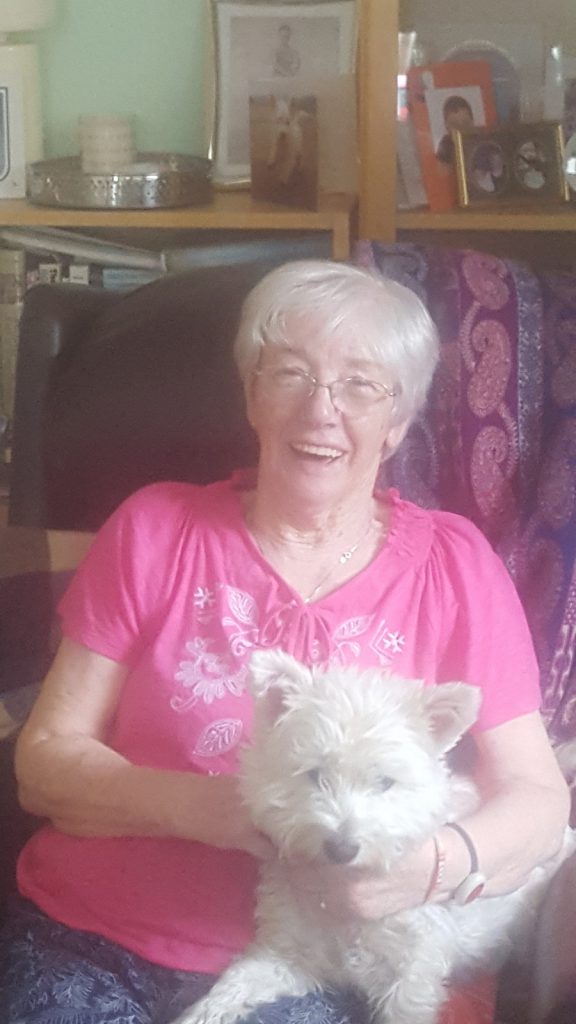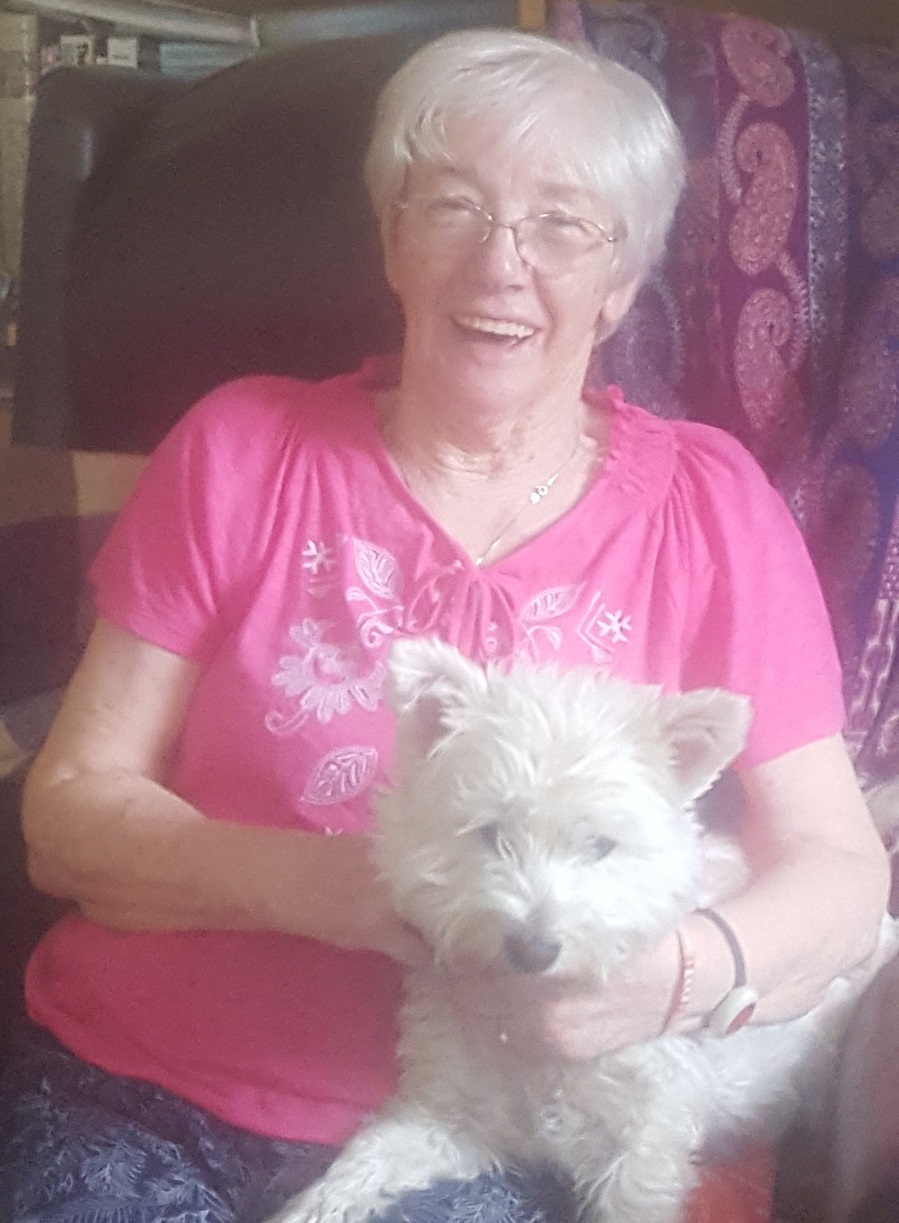What is MND
Find support
I have MND
I am supporting someone
Get involved
Research
About MND Scotland
What’s new?
© MND Scotland 2024
© MND Scotland 2024

The retired police secretary, and grandmother of five, has always been a constant pillar of the community. A widow with two children at the age of just 29 years-old, Greta was forced to be fiercely independent her whole life.
While wanting to keep her independence for as long as possible, family members and local village friends have stepped up to support her when needed. Since her diagnosis of MND, Greta has kept a positive outlook and cannot wait for ‘shielding’ restrictions to lift so she can get back out in the community and live life to the fullest.

“I’ve always been heavily involved in the community and have loads of friends through this. So not being able to get out of the house these past few months has been hard. It’s difficult not getting to see the grandkids as much but they are getting down to visit me now. I just can’t wait to get around the village again and see what’s been going on the past three months.”
Greta added, “Thank goodness for my wee westie Maisie, she has been such great company during the last few years. As I became more disabled and not able to take her on walks, a really good friend now takes her every morning during the week, and a neighbour’s daughters take her at weekends. I am so lucky to live in a village and be well supported by everyone. She is such a friendly wee dog; she loves everyone and all my carers spoil her.”
Greta has also found MND Scotland’s Video Support Group particularly helpful, enabling her to stay connected to others affected by MND during the pandemic.
“When they were running, I went to the MND Scotland Support Group in Edinburgh. I loved it. That’s just the kind of person I am. I want to get involved and meet people – that helps me. I know other people don’t want to go to things like that, but I’ve found it very helpful going to meetings. It affects us all differently and yet the same.
“We’ve moved online to a video call every week. They are so good and very informative. Everyone is really upbeat which makes a difference. We’re a happy crowd – we’re not sitting in doom and gloom. All you can do is keep a good attitude and try to stay as positive as you can.”
Diagnosed with MND in 2019, Greta was initially thought to have had a silent stroke, first realising something was wrong in early 2017.
“I noticed the left-hand side of my body was getting really weak. I remember visiting my friend in Canada and was in her swimming pool, but I ended up just swimming in circles because my left leg wouldn’t work! I looked awful silly, but you have to laugh at these things as well.
“I then had a number of trips and falls so decided to go and get checked out. My family were very shocked when we were told it had been a stroke. However, as time went on, my symptoms were getting worse instead of better, so I went back and was referred to a neurologist.
“I wasn’t all that surprised to be honest. My hands had been shaking for a long time so I thought it might be Parkinson’s or something similar, but my family were absolutely gutted when I told them. They had just gotten their heads around it being a stroke and were now being told it was MND, which was an even bigger shock to them.
“I was quite upbeat when I told my children, George and his wife Susan, and Lynda and her husband Derek. It took a while for it all to sink in. I think my daughter in particular found it really tough. She was just devastated. I think it must be difficult for them to see their parent going through this.
“It’s only now that it’s really sinking in for me, as things start becoming more and more difficult. I’m getting slower and weaker but the way I see it you just have to battle on and keep going. I try to be as positive as I can and see the fun in life wherever I can.”
Since the beginning of lockdown Greta has noticed a change in her symptoms, but is continuing to get the support she needs, “Staying indoors definitely hasn’t helped my mobility. I have noticed my symptoms progressing. I used to get massage therapy and physiotherapy until they stopped because of coronavirus. I think that’s slowed me up too. I’m just not getting the same amount of exercise. Even going down the steps at my front door was good movement which I can’t myself anymore, so we are trying to get something sorted to help me get down more easily, like a ramp. I currently need help to get out of the house, so it would make a big difference to be able to get down the steps by myself. My world would open up again. I’ve been in this house for 50 years and I don’t want to have to move – this is where my family memories are.
“As I’m on the government’s shielding list I’ve been getting good support and am using the online shopping delivery slots which has been a huge help. I’m very lucky. I’m used to being independent so even though friends and family help a lot I don’t want to bother too many people. I now have a cleaner and a gardener, and I have carers coming in in the morning, at teatime and in the evening – I can always have a good laugh with my carers as they are from the local village too. The most important thing for me is trying to keep my independence for as long as possible.”
Craig Stockton, MND Scotland’s Chief Executive, “I’d like to thank Greta for bravely sharing her story, especially during these uncertain times. For people living with MND, time with loved ones is precious. Social-isolation measures, while essential, have placed huge restrictions on the care and support many rely on every single day. Even basic companionship, like having a friend or loved one pop round to say hello.
“That’s why we launched our new services hub, to help us stay connected to families in Scotland, so no one has to go through MND alone. ‘MND Scotland Connected’ at its core provides one-to-one phone support, video support groups and emergency financial grants. People with MND need us more than ever, so if you’d like to help support people affected by MND you can donate here.”
Sign up
for newsletter
Get the latest news and events straight to your inbox
You can help create a world without MND